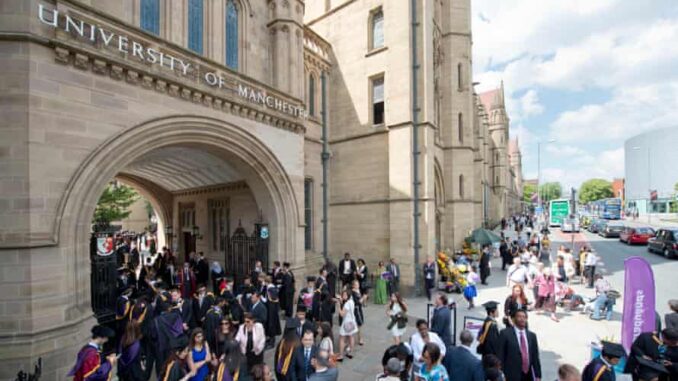
The idea has met with uproar from Manchester students, but if it results in more teaching hours, all the better
Lectures are rubbish education. They should have gone out when printing was invented and students learned to read. The vanity of monks and preachers kept them going and set them up for university education ever since. Lectures have nothing to do with teaching, which is an interactive process. They are academic showbusiness.
Yet 3,000 Manchester University students have signed a petition to save their lectures after the pandemic and stop them going online under what is called “blended learning”. They seemingly prefer to have to attend a draughty lecture hall at a fixed time and snooze through a ritual hour of note-taking, as if attending high mass. They are sceptical of the university’s statement that a new “online default model of teaching” will not diminish their “contact time”, even if it offers the comfort and convenience of tuning in to lectures wherever and whenever they choose.
For universities, lectures have always been cheap and easy, and now they have become more so. The pandemic has shown what anyone could have told them: that online saves room space and, horror of horrors, allows lecture quality to be monitored. The London School of Economics – like apparently 80% of universities that have lecture recording technology – has become a virtual video production company. Lecturers can in theory record their pearls of wisdom in a few days, shove them online and answer any student questions on Zoom. Research into “lecture capture” – that is recording and transmission – shows that it benefits all concerned.
If lectures are the real university, there is no point in students sitting in expensive residential towers when they could be studying at home – or even in gainful part-time employment. As content, a lecture is no different from an article or a book. Give or take issues of copyright, it could be disseminated nationally so students everywhere could listen. How many new lectures each week does Britain really need on Shakespeare’s sonnets or the history of the Victorian railway? The waste of academic resources must be huge.
What the Manchester students really want – and have sorely missed during the pandemic – is not the lecture, but proximity to a live academic. They want classes, seminars, debates, tutorials and conversation with teachers and like-minded students. Having benefited from a tutorial education myself, I find the idea of a university without such regular human interaction not unthinkable but immeasurably less rich.
Students in England have paid up to £9,250 a year for a collegiate experience. It is what most science and medicine students get in their practical work. Yet a lecturer friend says he reckons to spend less than two days a week for barely a third of each year actually in the presence of students. The rest of the time he is working “to government orders” on examinations, bureaucracy and desperately, aimlessly quantifiable research.
In his 2016 book The University of Oxford: A History, Laurence Brockliss predicted that British universities faced “an uncomfortable future”. It was “only a matter of time before virtual learning makes inroads into higher education” and transforms its structure. Residential universities, vastly expensive in national terms, would be seen as a luxury. All universities should in some sense be “open”, their teaching no longer exclusive and their distinctive qualities lying in their socialisation, particularly in student and teacher interaction.
Great institutions traditionally need traumas – wars or pandemics – to force them to change. To those who went to university before the digital revolution, it is astonishing how little the upheaval in information retrieval and communication has altered academic methodology: the term, the lecture, the essay, the exam, the gown, the “degree”. It seems absurd for a course to still need to be spread over three seven-month years, to allow for the harvest and church festivals. To watch a university react to a changing world is like watching the medieval papacy react to Luther’s Reformation – with horror and antagonism.
The live lecture may be dead, and if it means more teaching, all to the good. But as long as the money flows, these places will never change.
- Simon Jenkins is a Guardian columnist


Be the first to comment